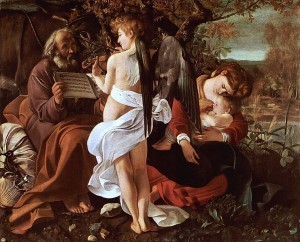Daily Caravaggio: Rest on the Flight into Egypt
 To coincide with the paperback publication of my Caravaggio novel A NAME IN BLOOD, I'm posting each of the paintings that appear in the book each day this month. The Rest on the Flight into Egypt is one of three Caravaggio masterpieces housed at the fabulous Doria Pamphilij Gallery in Rome. It's from about 1597 and is quite unlike his more characteristic later works. But it makes a great impression for the deeply human way in which he portrays relationship between the Virgin and her son. Here's Caravaggio recalling his work on the painting in my novel:
To coincide with the paperback publication of my Caravaggio novel A NAME IN BLOOD, I'm posting each of the paintings that appear in the book each day this month. The Rest on the Flight into Egypt is one of three Caravaggio masterpieces housed at the fabulous Doria Pamphilij Gallery in Rome. It's from about 1597 and is quite unlike his more characteristic later works. But it makes a great impression for the deeply human way in which he portrays relationship between the Virgin and her son. Here's Caravaggio recalling his work on the painting in my novel:
He barely knew what he had done at the time, a few years after arriving in Rome. A scene of the Holy Family succoured by the music of an angel as they fled the vengeful Herod, painted with the dreamy clarity of the Venetian school. But later, in the gallery of the Lady Olimpia Aldobrandini, he had recognized that his heart was imprinted on the canvas.
In that painting, exhausted by the journey, the Holy Mother rested her cheek on her baby’s head. The little Jesus, also half-asleep, picked at her mantle, as though he dreamed of feeding at her breast. Menica’s friend Anna had modelled for the Virgin. She had understood that her life as a cheap whore wouldn’t be a long one. Still she had faith that there might be an escape. Caravaggio had illustrated her hope and fear and acceptance in the drained, loving Virgin. The love of a mother who knew her son would be a sacrifice and was yet willing to undergo the hardships of the desert to preserve him for it. I saw all that in the face of a whore.
Anna had been dead a year now, at twenty-five, her skin wasted and scarred, her red hair dry and lustreless. He was with her at the end, and she had reminisced about the sixteen-year-old beauty he had painted as the Virgin. When she expired, he had dropped his head to her breast and shocked himself with his weeping. He had known many whores who had disappeared from the streets with little more than a shrug from him. Yet he had cried for Anna as though she had invented death, a malignant novelty displayed in a gallery which only he might view.
Published on August 12, 2013 01:43
•
Tags:
art-history, caravaggio, covers, crime-fiction, food, historical-fiction, italy, rome
No comments have been added yet.



